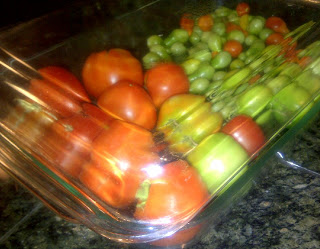Sometimes small details and little touches, harness incredible powers - transforming "simple" into "simply elegant." A good dose of good luck landed me in Honolulu this week for an entire week. What greeted me as I opened my hotel room door was a beautiful and exceedingly welcomed late afternoon treat; papaya with lemon wedges that proved sweeter than any I've ever enjoyed on the mainland.
(Blogger's observation: do not to say "in the U.S.A" but rather remember the word mainland, lest you come across as a total moron!)
I couldn't help but wonder if, in fact, this papaya really was much sweeter than those I usually eat at home in Chicago or whether my perception of flavor was the result of an interplay between my sense of vision and my sense of taste. Besides, I arrived ravenous. It was too late for lunch, too early for dinner, and my body clock knew it was four hours beyond the local time.
Like most things in my life, I immediately related my quandary to a book I'd read - one in which the author addressed these dilemmas head on; the influence of our senses upon one another, all tied up in our perceptions. And hence - what I remembered was the interplay between vision and the taste of food as we've perceived it.
And that book?
Proust Was a Neuroscientist, a non-fiction book by Jonah Lehrer published in 2007.
In this book, Lehrer contends that Proust, along with most of his fellow artists, discovered things about the brain that took Neuro-scientists decades to understand. There is an inter-connectedness between art and science but there's also a crucial impact visual presentation has upon our other senses. My favorite discussion pertains to how important detail is in the way a chef plates his or her culinary creation. We learn much about the visual display's influence upon the diner 's enjoyment of the food's taste and smell.
Lehrer also presents profiles of eight artists - most of whom are writers but also include a chef, painter and composer. The author argues that often these creative individuals understand vastly more about our perceptions than do neuro-scientists. The primary observation: truth can begin with "what reality feels like." I suppose that might also be "what reality tastes like"!
So, even though the book examines the importance of art and the role that vision has in human perceptions including sensory stimuli such as taste and smell, Lehrer also addresses art and artists. The wonderful quality of this book is that it reminds us how complex and subjective our perceptions really are.
I consider Lehrer's peak essay to be his piece about
Auguste Escoffier, the chef credited with inventing modern French cookery. Lehrer's personal interest in food preparation leads to his research about the invention of MSG ( monosodium glutamate) and umami - the amino acids that play with our taste buds. In this way, science influences perceptions about taste.
The author's background includes lab work, science writing and fine cuisine. He's discussed Cézanne's breakthroughs in understanding human sight, Walt Whitman's comments about how biology influences our thoughts and- the impetus for the book, Proust's efforts to tap into his memory by immersing himself in childhood recollections.
As recently as five years ago, The Wall Street Journal challenged conventional culinary science with its story entitled:
A New Taste Sensation- Parmesan cheese has it. So does ketchup.
It's umami, and it's changing the way everyone from top chefs to Frito-Lay executives thinks about food. WEEKEND JOURNAL December 8, 2007 reported about the mysterious (at least in the USA) role umami plays in our perceptions of taste.
"Americans are taught from an early age that there are four basic tastes -- sweet, salty, sour and bitter. But what describes the taste of chicken soup?"
An ever increasing number of professional chefs and food-industry experts have begun to refer to "umami," as "the fifth taste."
Lehrer tells us that umami was first identified by a
Japanese scientist more than century ago but it remained a very obscure culinary concept. The reason? it's tough to describe and to define although it's commonly discusses as a meaty, savory and very satisfying taste.
And so that all came back to me in the multi-sensory encounter with a papaya! Think about what you'll be tasting after you've given your food a good stare-down.

.JPG)

.JPG)
.JPG)

.JPG)








